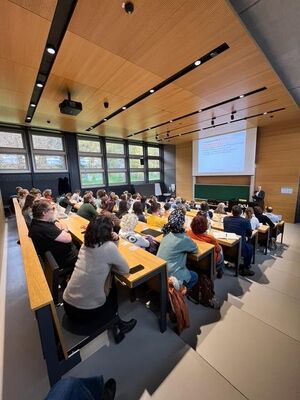BL13-News 04/24
Information by the University Union
This fall was characterized by various election decisions. Irrespective of the fact that government negotiations at federal level are not yet underway, the conclusion of performance agreements between the Federal Ministry of Education, Science and Research and the individual universities determined key decisions regarding basic funding. Salary negotiations for university employees were also concluded in November.
Against this background, the following articles are included in this issue:
- Results of the salary adjustment negotiations and their genesis
- Staff representation elections: Results and outlook for further representation work
- Review of an event in Linz on the topic of labor law with Walter Pfeil
- Impressions of quality assessment in appointment processes at Austrian universities
- Brief information on personnel changes in the (extended) Federal Executive Board 13
We look forward to your feedback via e-mail to redaktion.bl13@goed.at and wishes everyone a relaxing Christmas and a good start to the New Year!
Salary negotiations for 2025
Results and how to get there

The results of the salary negotiations for 2025 were finalized at the beginning of December 2024 - such an early conclusion has rarely been reached in recent years.
The signs were different: Budgetary bottlenecks at federal level have led to gloomy expectations of a zero pay round for civil servants and civil contract staff. In the separate negotiations on the collective agreement for the majority of university staff, which were conducted by the Federation of Universities with representatives of the Public Service Union, there was the uncertainty factor of the financial outlook for the upcoming performance agreement period 2025-27.
The negotiation dynamics and results differ. The results in brief:
Universities Collective Agreement | Civil Servants |
|
|
Now to the dynamics of the negotiations: The agreement on the University CBA was reached on 18.11.2024 as part of the first salary round between the Federation of Universities and the GÖD. It should be noted that talks on adjustments to the salary scales for general staff and the B scheme for academic and artistic staff have been ongoing for some time, as we reported.
The scheme for general staff will be adjusted as of January 1, 2025, whereby the last advancement steps will be shortened and an additional salary step will be introduced, as well as the fixed award of expert status as an additional salary step. Detailed information in the current annex to the collective agreement.
In the area of academic and artistic staff, after years of negotiations on the B scheme, a gradual approximation was also achieved, so that the last advancement step will be increased by 250 euros and, after 8 years at this level, a further salary step of 500 euros will be introduced from 1.1.2025, valid for all colleagues already in service. However, this was only offered by the employer at the last minute (i.e. individual overpayments must be included). Nevertheless, this is the first step towards a rapprochement that has seemed impossible over the last five years. A table already valorized by 3.5% as of 1.2. shows the details.
Our Federal Executive Board sees this result as a first partial success, although there are still some major challenges ahead in the B scheme: Increasing the starting salary and reducing the advancement periods from 8 to 6 years. We will continue to work towards returning the effective date of salary adjustments to January 1 of each year, as it is not clear why different effective dates should apply to people in the public sector.
Due to the industrial dispute in the public sector that emerged in mid-November, it was agreed with the GÖD's chief negotiator, Hans Zöhling, not to disclose the results beyond the valorization, which is why we are only now able to inform you of this result.
We do not want to go into the genesis of the negotiation result of the civil servants' agreement in detail here, as it has already been reported in great detail in the media. Eckehard Quin and his team are convinced that the pressure build-up with the concerted works meetings in many federal offices and the strike clearance by the Austrian Trade Union Federation (ÖGB) have not failed to have an effect and have thus helped the negotiators to avert a zero wage round.
This year's salary adjustments are the result of a great deal of energy and preparatory work, which cannot be taken for granted. We would like to take this opportunity to express our sincere thanks to our colleagues who work at the interface with the GÖD's chief negotiators - above all Martin Tiefenthaler, Stefan Schön and Karl Reiter.
Elections of the Federal Staff Representatives
Results and outlook

In addition to elections to the National Council and, in some federal states, to the provincial parliaments, there were also federal staff representation elections.
At universities, the proportion of colleagues eligible to vote is constantly decreasing. This year, there were only 1762 civil servant academics and artists out of a total of 45,588 people working in the academic and artistic field at Austrian universities (as of December 31, 2023, unidata).
Even though this group of civil servants in our field is becoming smaller and smaller in terms of numbers, they still need a well-functioning representation and, as before, the best possible advice and support for their individual problems, the so-called Central Committee (Zentralausschuss, ZA for short).
Two lists are running in this year's election: The List ULV-UG, the list of the non-party representation of all university teachers, and the List FSG, Public Service Union - list of social democrat unionists.
The result of this staff representation election is as follows:
Valid votes 733
Voter turnout 41.77%
ULV-UG 602 votes, 82% = 4 mandates
FSG 131 votes, 18% = 0 mandates
Based on this result, the first four candidates on the List ULV-UG, Christian Cenker (University of Vienna), Ulrike Hugl (University of Innsbruck), Johannes Kastner (MedUni Vienna) and Martin Tiefenthaler (MedUni Innsbruck) will take over responsibility for the staff representation of civil servant colleagues, the Central Committee for University Teachers of the Offices of the Universities at the Federal Ministry of Education, Science and Research, for the next five years.
We wish the elected colleagues every success in their representative work!
Perspectives look different
Lunch Lecture with Walter Pfeil

On November 14, a lunch lecture at the JKU Linz with labor law expert Walter Pfeil on the topic of “Precarious science through legal framework conditions?” provided insights and information on the actual legal situation under the Universities Act.
This event was urgently needed, as rectorates and the associated personnel management often provide little transparent and sometimes contradictory information on the maximum duration of employment. The Lunch Lecture was organized by the Upper Austrian Regional Executive Board (GÖD OÖ LL13) and the Unterbau Linz initiative in cooperation with the Works Council for Academic Staff at the JKU Linz and the Works Council for Academic and Artistic Staff at the University of Art and Design Linz.
After a general introduction to the topic and the issues involved, Walter Pfeil mainly dealt with the two paragraphs in the Universities Act that deviate from general employment law: Section 109, which regulates the maximum length of possible fixed-term contracts and is also known as the “chain contract regulation”, although it contains exceptions to the chain contract regulation of Austrian labor law, and Section 110, which allows the permissibility of all-in contracts and ensures the free allocation of time for employees at Austrian universities.
In connection with Section 109, Pfeil explained, among other things, that when pursuing a linear career path (from pre-doc to professorship), a maximum fixed-term period of 22 years can be achieved at a university due to the numerous exceptions defined by the University Act! Whether this is in the employee's favor in practice remains questionable. What is certain, however, is that it clearly contradicts the intention repeatedly expressed by decision-makers to secure prospects early on in a career!
Walter Pfeil was also very clear about the scope for action: “The law offers sufficient freedom to pursue a sustainable and promising personnel policy, the responsibility lies with the rectorates. If they fail to do so, political pressure is needed, according to Walter Pfeil.
In this sense, the lecture provided a direct appeal to all those affected, which was also taken up by the 60 or so participants present and 40 connected via video in an exciting discussion. Once again, the outrage at the full exploitation of this exceptional paragraph at universities was evident. The Federal Executive Board is committed to ensuring that fixed-term contracts are only possible in manageable phases and that there are permanent career opportunities at universities. The law allows this in principle! You can find out more about the union's position on fixed-term contracts on the BL13 homepage.
Evaluations of professional appointment procedures: Leadership competence?
Inputs by Ulrike Felt and Maximilian Forcher

In October 2024, the results of a study on “Quality Assessments in Professinal Appointment Processes of Higher Education Institutions”, which was published at the beginning of this year, were presented as part of the extended Federal Executive Board 13 (found at https://www.osa-openscienceaustria.at/wp-content/uploads/2024/01/Konferenz-Karrierewege-Folien-Felt-Fochler.pdf).
Ulrike Felt and Maximilian Forcher presented parts of their analytical review of practices, perspectives and challenges, focusing in particular on the handling and assessment of leadership skills.
From the perspective of staff representatives, a central point in everyday practice is that many ambiguities or even conflicts arise because managers do not fulfill their role or are overburdened in their function. In most cases, professorships also require leadership skills in the management of a team or an organizational unit. It is therefore of interest to what extent and in what form the selection processes for these positions are based on this assessment of competence.
The original aim of the study was to map the current state of discussions on the processes of defining and measuring the quality of academic performance in the context of professional appointment procedures. Although the focus of the study was to be on selection processes for professorships according to Section 98 of the University Act, the authors of the study make it clear that these processes cannot be seen in isolation and were not seen separately by the participating institutions and their interviewees: This is because the development and application of various quality dimensions and criteria also interact with other personnel categories. The study authors emphasized that it is crucial to design quality assessments in such a way that not one dimension of quality (such as research) or one form of evidence (such as quantitative indicators) alone determines the outcome of the procedure. They emphasize the importance of using weighted criteria catalogs as well as balancing unequal levels of evidence - as practiced, for example, by one institution in the form of a multidimensional performance evaluation model.
With regard to the focus of the evidence or the importance of leadership competence in these processes, it became clear that there are very large differences between the institutions and their practices. It has been shown that there are very large differences in how much time is spent with the candidates inside and outside the formal hearings and how explicit reference is made to the topic of leadership. In many institutions, leadership competence is not yet a central component of the assessment. The following quote for the status quo illustrates this: “In principle, it is assumed that these are future professors, they can do it.” (Felt/Forcher 2024, p. 66).
However, there are institutions where it is customary for applicants to be given an insight into their potential future workplace and the technical and spatial facilities as part of a tour of the institute - often accompanied by a joint lunch or dinner with the applicants in order to sound out their “compatibility” with the intellectual and social environment. In addition to statements on teaching philosophy, other institutions have also integrated statements on “personnel management” into the canon of application documents. One institution even worked with HR consultancies for this dimension in order to obtain further information and a basis for the decision-making process.
The authors of the study come to the conclusion that, on the one hand, leadership competence is the dimension of qualitative criteria for which the assessment of the importance and quality of its evaluation in committees differs the most, but on the other hand, it is important to pay more explicit attention to this dimension in view of the importance for the success of the personnel selection process.
As staff representatives, we can only agree with this assessment and work towards ensuring that our institutions pay more attention to leadership skills in selection processes!
Changes in personnel
Federal Executive Board 13 and extended Federal Executive Board 13

In recent months, a number of long-standing members of the Federal Executive Board 13 have stepped down. This has created the need to fill their positions: Christoph Bedenbecker (University of Innsbruck) und Drago Pintaric (PLUS, Salzburg) have retired. They will be succeeded by Ulrike Hugl (University of Innsbruck), Christian Wessely (KFU Graz) and Eleonora Hübner (PLUS) from the extended federal management.
Due to this change of colleagues, further retirements and professional changes, there have been a large number of new additions to the extended Federal Executive Board 13.
Christoph Brezinka (MedUni Innsbruck), Nikolaus Bresgen (PLUS), Ursula Doleschal (University of Klagenfurt), Rony Flatscher (WU Vienna), Rüdiger Kaufmann (University of Innsbruck), Thomas Meyer (JKU Linz), Ewald Pertlik (BOKU Vienna) have left.
We would like to thank these colleagues for their contributions and commitment and wish them all the best and, above all, good health for their well-deserved retirement and new activities.
We would also like to welcome our new colleagues: Mario Humer (JKU Linz), Janett Kreutziger (Med Uni Innsbruck), Thomas Kaltenbacher (PLUS), Monika Niedermayr (Uni Innsbruck), Michael Lindenthal (Uni Innsbruck), Florian Part (BOKU Vienna), Stephan Pühringer (JKU Linz), Thomas Rusch (WU Vienna), Aho Shemunkkasho (PLUS), Martin Weiß (Uni Klagenfurt), Gerhard Wohlfahrt (KFU Graz).
We look forward to your cooperation and, above all, to new suggestions and contributions to our joint work in the BL13 employee representation.
We look forward to continuing our open and constructive exchange in the future and to advancing the concerns for the improvement of working conditions at universities!